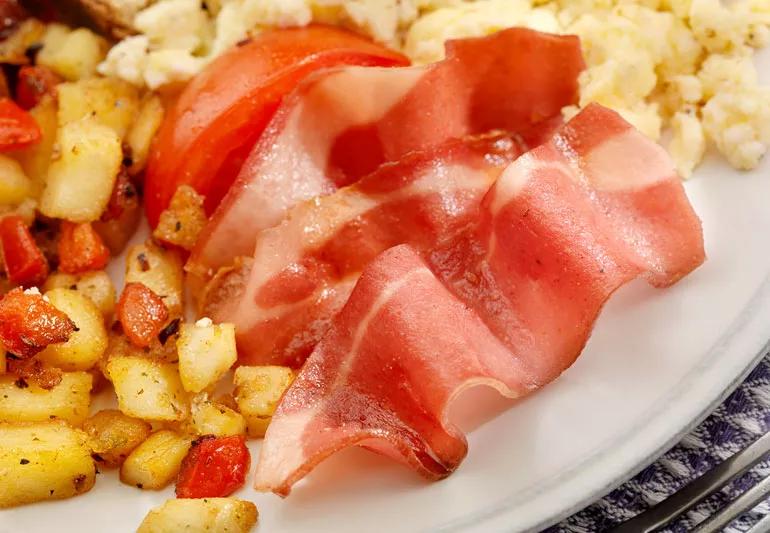As with traditional pork bacon, eat it sparingly

Image content: This image is available to view online.
View image online (https://assets.clevelandclinic.org/transform/a1def8fd-2d66-4f63-930f-b0ea4d440c0d/turkyBacon-181897258-770x533-1_jpg)
turkey bacon with breakfast eggs
Some calorie- and fat-conscious eaters choose turkey bacon as a healthy alternative to the pork variety that traditionally graces breakfast tables.
Advertisement
Cleveland Clinic is a non-profit academic medical center. Advertising on our site helps support our mission. We do not endorse non-Cleveland Clinic products or services. Policy
But, according to dietitian Laura Jeffers, MEd, RD, LD, this substitute is still high in saturated fat and sodium and doesn’t carry as many health benefits as many believe.
In fact, opting for turkey bacon as the “healthier” choice can have a negative impact on your health.
“Believing it’s the better option, you may eat too much,” Jeffers says. “I tell my patients to limit bacon products – including turkey bacon – to less than one serving per week in their diet.”
Pork bacon comes from the belly of a pig. Turkey bacon is dark and light meat turkey seasoned like bacon and pressed into bacon form.
“As with bacon made from pork, turkey bacon is high in saturated fat and sodium – two substances that put you at greater risk for developing heart disease,” she says. “And the similarities don’t stop there.”
Protein: Each 2-ounce serving of pork or turkey bacon has roughly the same amount of protein. Pork bacon offers 20 grams per serving. Turkey bacon provides 17 grams.
Calories: Turkey bacon contains fewer calories than pork bacon, but the difference per 2-ounce serving is small – 218 vs. 268 calories.
Fat: The overall fat content in turkey bacon is significantly lower than pork bacon – 14 grams vs. 22 grams. The level of saturated fat is still high, however, with 4 grams vs. 8 grams, respectively. High saturated fat content contributes to heart disease.
Advertisement
Sodium: If you don’t select reduced-sodium bacon, just a few slices can max out your daily recommended intake of salt – less than 1,500 milligrams according to the American Heart Association. Two ounces of turkey bacon has more than 1,900 milligrams of sodium. The same amount of pork bacon contains roughly 1,300 milligrams. In addition to increasing your risk of heart disease, high sodium intake raises the likelihood of kidney stones.
Vitamins: Turkey and pork bacon both provide vitamin B complex nutrients, but pork bacon offers more. Pork also contains more selenium, a mineral that activates certain proteins associated with preventing cancer. Turkey and pork bacon contain roughly the same amount of zinc, which helps control gene activity.
If you choose turkey bacon, follow these tips for the healthiest outcome:
“With any food that claims to be healthier, it’s important to be armed with the facts,” Jeffers says. “Portions are always an important consideration as well as the nutritional details.”
Advertisement

Sign up for our Health Essentials emails for expert guidance on nutrition, fitness, sleep, skin care and more.
Learn more about our editorial process.
Advertisement
Pick bell peppers to help fight cancer, memory decline and joint pain
The tropical fruit is a good source of antioxidants and vitamin C
High amounts of cholesterol and saturated fat in red meat may be linked to heart disease
The leaves and pods from this tree are rich in essential nutrients
This starchy root vegetable is a staple in many global cuisines — but it has to be prepared correctly, or it can cause serious concerns
These delicate green sprouts can give you an extra dose of vitamin K and other nutrients — but they’re not safe for everyone
Edamame, lentils and chicken breast are good sources of protein
Eating this root vegetable can help support your eye, heart and brain health
Prioritize your health by managing stress, strengthening your social connections and getting quality sleep
Bolsters, blankets, pillows and blocks can offer extra support, stability and comfort
Allergies, postnasal drip, asthma or reflux could be to blame for a cough that won’t quit